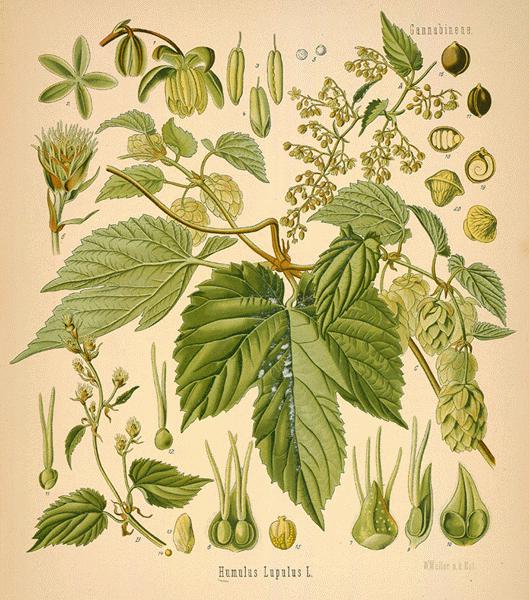 I recently found an old book called "Hops: Their Cultivation, Commerce and Uses in Various Countries", by P.L. Simmonds, which is digitized on Google for your reading pleasure. Published in 1877 this book is billed as a "Manual of Reference for the Grower, Dealer and Brewer" and has way more information than I needed to know. However, there was a chapter in the end about hop substitutes that I just had to pass on to you, the loyal readers.
I recently found an old book called "Hops: Their Cultivation, Commerce and Uses in Various Countries", by P.L. Simmonds, which is digitized on Google for your reading pleasure. Published in 1877 this book is billed as a "Manual of Reference for the Grower, Dealer and Brewer" and has way more information than I needed to know. However, there was a chapter in the end about hop substitutes that I just had to pass on to you, the loyal readers.Among the bitter and tonic substances which have been used as substitutes for hops are the bark of some species of pine and willow, cascarilla bark, quassia, gentian, colocynth, walnut leaf, wormwood bitter, cloves, extract of aloes, cocculus indicus berries, colocynth seeds, capsicum, belladonna, nux vomica, Ledum palustre, box leaves, Menyanthes trifoliata, Cnicus benedictus, Erythrea Centaurium, ground ivy, Daphne Mezereum, &c.; recently picric acid has been employed. Although all these substances impart a bitter taste to beer, they are inferior to hops. Many of them contain the same constituents, namely, tannic acid, a resin, a bitter extractive, and an essential oil.Scratching your head too? I wonder how a brewer today would market some of this stuff - "made with real box leaves", or maybe "now with more walnut leaf!" The next page simplified the list a bit:
The list of principal adulterants... would seem as follows:Deadly Nightshade? Isn't Deadly Nightshade, I don't know, deadly? My goodness, it seems brewers used anything they could get their hands on then to bitter their beer. You see, it seems there were Duty issues with hops and the prices seemed too high for some to pay, so options were sought out. I don't think our current hop situation puts us anywhere near this level of desperate meddling of plants to discover a new (old) way to bitter, and for that I am grateful.
Quassia wood
Wild Rosemary
Wormwood or Absinthe
Water Trefoil
Blessed Thistle
Lesser Centaury
Gentian (Indian quinine)
Willow bark
Aloes extract
Picric acid
Meadow Saffron
Fruit of Chillies
Deadly Nightshade leaves
Henbane leaves
Seeds of Nux vomica
Grains of Paradise, seeds of
Chiretta, the plant
Camomile, flowers of
Alehoof, or ground ivy
Oh, we should also take comfort in knowing this isn't the first "hop crisis" the world has seen. Just over a hundred years ago there seems to have been a pretty nasty hop shortage. Why do I know? I'm helping my wife with research for a paper she's writing, looking at a ton of old hop price and production data and reading more about hops than I have since I started homebrewing - and very little of it is technical. I've also stumbled across some stories I can't verify about the way banks would flood the market with hop extracts when they sold assets of farmers who couldn't pay them back on time - further dropping the prices and further exasperating the issues farmers faced! What a crazy, crazy business!
I will say this, and I hope my brewer friends don't hate me too much, but I'd be really freaking cautious if I were a farmer right now looking to plant hops. I have so many questions now - like what capacity are the modern hop kilns running at and what happens if a hefty amount more hops were grown, could they be kilned? If not, who is going to pony up the money for a kiln? Not to mention trying to figure out the right amount to put in the ground. Plant too much and the value drops. Too little, well, then you have too little. Hops are freaking expensive to plant and tend to on a farm-size scale, and missing the estimate could, seriously, cost you the farm. Crazy, crazy stuff.
Bottom line, the small increase in the price of beer is nothing. I am sure you've noticed everything is more expensive, and it may be worse before it gets better. Beer isn't overpriced, and for many it is undervalued. Thank you brewers, farmers, brokers and drinkers.
Oh, if you're looking for another great book with old hop stuff, check out The Hop Atlas by Heinrich J. , Klinke, Christiane , Schmidt, Claus Barth. This was available at a local library, but I've had trouble finding a copy online for my own library.